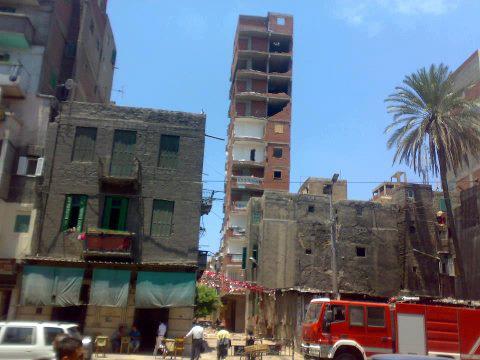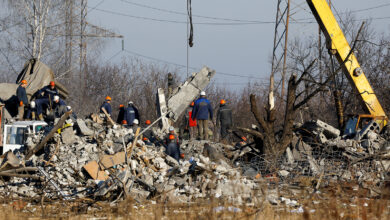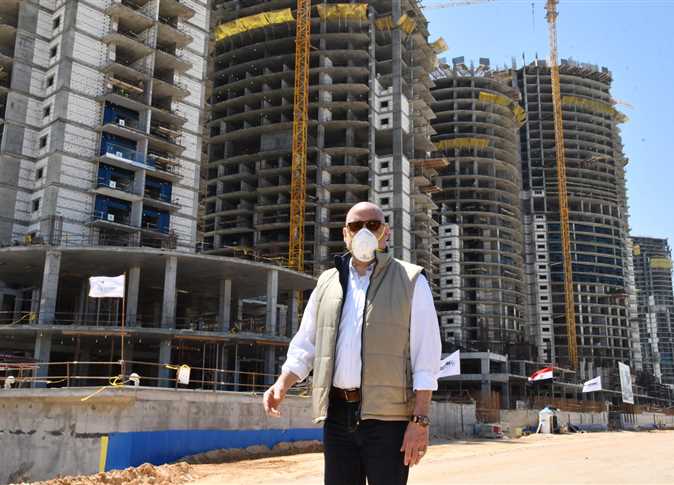
In the upscale neighborhood of Abbas al-Akkad in Nasr City, Amr Hegazy owns a five-story building surrounded by prominent restaurants. Passing by the building situated on a tree-lined street, one may speculate that Hegazy makes at least LE20,000 in rent per month, but he makes only a tiny fraction of that figure: a measly LE64.
“I don't have any control over my own property, whether how much it's rented for or even the authority to ask a tenant to leave if he violates my property or causes me any trouble,” Hegazy says.
Like Hegazy, other landlords suffer from the same restrictions under an old rental law that applies to buildings constructed before 1996.
Law 49/1977 freezes the rental value and enforces the renewal of the contract between the tenant and the landlord, sometimes passing the apartment down through generations.
The value of the Egyptian pound has plunged since 1977 and the country has seen significant inflation, but the rental value of many apartments has remained static.
Hegazy, the general coordinator of the association against the old rental law, and his siblings inherited the building bought by their father in the early 1980s as an investment to support his family. However, Hegazy says that the LE12 each tenant pays per month does nothing to improve his income.
In the more modest area of Rod al-Farag in Shubra, residents pay as little as LE3.50 each month for rent.
“The garbage man gets paid more than what I get for rent,” said landlord Mohamed Fotouh.
Fotouh, 76, is a retired plumber. When he bought his property in 1969, he had hoped that it would serve as a financial cushion for him in his old age, but now he can barely make ends meet.
“I worked hard and sweated to be able to buy this building, and now I can't even afford to buy a loaf of bread,” he said.
The old rental law allows the tenant's spouse or child or parent to inherit the contract after the original tenant dies. An amendment to the law in 2002 limited the ''extension'' of the contract to only one of the tenant’s immediate family members who lived in the apartment. Before this amendment the extension of the contract was open to all family, to be passed down through generations.
“The tenant's children are allowed to inherit my property while, I, the owner of the building can't give it to my own children,” Fotouh said.
He had dreamt that his five girls would get married and live with him in the same building, but he says his daughters are forced to stay in Qalyub district in Qalyubiya governorate away from Cairo, because his tenants refuse to leave the property. Each of his daughters pay around LE400 per month for their apartments.
Landlords complain that tenants try to hustle them for money in exchange for leaving their apartments; some say they can ask for up to a quarter of a million pounds.
“Why should I have to buy my own property twice?” asks Hegazy.
Left to decay
Walking through Fotouh's building, the bad paint job, broken stairs and poor state of the building is apparent. The same decay and neglect can be seen throughout the neighborhood.
Residents say that a nearby building collapsed a few years ago due to neglect because the landlords can’t afford to pay for maintenance on their own, and tenants refuse to take responsibility.
Fotouh has been part of a five-year legal battle with his tenants over maintenance, as the structure continues to deteriorate.
“Why would a landlord pay LE90,000 in maintenance when he doesn't feel like he owns the building, even if we presume that he has the money,” said Hegazy.
Fotouh said he has no choice but to let the building decay, as the tenants rent won't cover even a tiny portion of maintenance.
Fotouh and Hegazy claim that their tenants are well-off, but they enjoy the almost free accommodation guaranteed by the old rental law that gives them owner-like status.
“The tenant speaks to me as if he owns the building, not me,” said Samir Ghoneim, who owns an 11-story apartment building in Dokki.
But in a country where almost half of the citizens live under the poverty line, many tenants say that they can't afford to pay reasonable rents for the apartments they've been living in for decades.
Khaled al-Beltag, a general manager in the Ministry of Manpower who pays LE10 per month for his apartment in Rod al-Farag, says he can't afford to pay the going rate of LE1,500.
“I have been working for 25 years in the government and my salary hasn't reached LE1,500. If I didn't work in the afternoon to increase my income, I wouldn't have been able to survive,” he says.
He suggests that the state raise government salaries and decrease the prices of vital products first before amending the old rental laws: ''Either that or I'll be forced to steal or live on the streets with my children,'' he says.
Azza Mahmoud, who lives in the upscale area of Heliopolis, says that both she and her husband are retired and cannot afford to pay LE3,000 a month for their apartment. Instead, thanks to the old rental law, they pay LE50 per month.
But the landlords argue that it’s not their responsibility to support those with low incomes.
“The subsidized bread isn't subsidized by the baker, but by the state, the same thing should happen with housing,” Ghoneim said.
“It's like the state is taking my money and giving it to someone else and there's absolutely nothing I can do about it,” Fotouh said.
Instead, he said the government should allow rents to raise, and then landlords could pay a 5 percent tax, which could go toward providing low-income housing.
Hegazy believes the problem hasn’t received enough attention and calls it a “national crisis.”
No one’s home
Around 2.6 million housing units fall under the 1977 rental law, according to 2006 statistics issued by the Central Agency for Public Mobilization and Statistics (CAPMAS).
According to a 2010 study conducted by former Ministry of Housing official Maha Abdel Fattah, the law has crippled the real estate industry, forcing many to illegally build houses in slum areas.
The study added that the law has pushed investors away from the real estate business, in addition to causing overcrowding in certain areas, which contributes to the chronic traffic problem because tenants ''extend'' the contracts to the apartments they've been renting since the 1960s to their children, meaning several generations of families live together in the same apartment.
The gap between supply and demand when it comes to housing in Egypt is around 916,000 units, according to official statistics of 2006.
Hegazy says that many landlords close their apartments rather than rent them out, because they don't make any profit under the old rental law. Other tenants who pay peanuts for their apartments close them and live elsewhere.
Around 7.5 million housing units in Egypt are vacant, according to 2006 statistics issued by CAPMAS.
Hegazy speculates that once the rental law is amended, these apartments will go on the market and with this increase in the supply; rents will naturally decrease and become affordable for more people.
The Ministry of Housing and Urban Development is addressing this mounting problem. Last month, the ministry issued a statement stipulating that a specialized committee, headed by Minister Tareq Wafiq, would begin meeting landlords and tenants in a bid to amend the law.
The 10-member committee is expected to issue a draft law within six months.
Nefisa Hahsem, head of the ministry's housing and facilities department, said that the committee has held only one meeting so far.
''We're conducting more of a study that will result in a draft law which will be proposed to the public and the People's Assembly for approval,'' she told Egypt Independent, adding that the committee is expected to meet once a week.
As landlords hail the ministry's step and hope that President Mohamed Morsy's government will fix the problem his predecessors created, tenants are holding their breath. Some worry that by next year, they could be forced to leave homes that have offered them decades of affordable shelter.
A century of rent control
The first law that controlled rents was issued in 1920, following World War I, to guarantee that citizens with low incomes had stable housing in the midst of economic difficulties that followed the war.
The law has been amended and issued in different forms since then, preventing landlords from ending their contracts with the tenant.
When late President Gamal Abdel Nasser took office in 1956, he took further rent control measures, reducing some up to 35 percent and putting a moratorium on increases.
But Nasser’s popular policies put a stop to significant development in the real-estate industry, as many owners and investors grew fearful that the government would issue more laws reducing their profits.
The 1977 law has been slightly amended several times, but the essence of the law has not changed. The Supreme Constitutional Court has deemed the law unconstitutional on several occasions, as it deprived landlords of their basic rights to manage their own properties. Until now, however, no serious steps have been taken to reverse the law.




